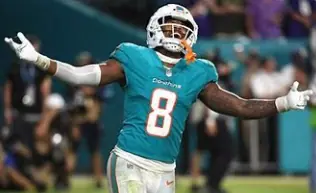Jevon Holland’s Value to the Dolphins: Great, Not $20 Million Great
Why the Dolphins Should Pause on Extending Jevon Holland
Jevon Holland is undeniably one of the most talented young safeties in the NFL. Since being drafted by the Miami Dolphins in 2021, he has shown tremendous flashes of potential, delivering impactful plays that have energized the defense and helped secure critical wins. But in the NFL, where salary cap management is a zero-sum game, decisions about massive contract extensions require more than flashes of greatness—they demand consistent, top-tier production. While Holland has been a valuable asset to Miami’s defense, his occasional lapses and inconsistent impact make it difficult to justify a long-term contract that would place him among the league’s highest-paid safeties.
Holland is set to become a free agent this upcoming offseason.
Holland Has Been Great—But Not Consistently Enough
Holland’s ability to make big plays is unquestioned. Whether it’s breaking up a crucial pass, delivering a tone-setting tackle, or making an interception in a key moment, he has shown he can be a game-changer. However, those moments of brilliance have not come often enough to warrant a contract in the range of the NFL’s elite safeties.
- Flashes vs. Consistency: While Holland has had stretches of excellent play, he hasn’t sustained that dominance over an entire season. He’ll have games where he looks like a top-five safety, only to follow them with performances that expose weaknesses in his coverage or tackling. Consistency is the hallmark of players earning top-tier contracts, and that’s where Holland falls short.
- The Minkah Fitzpatrick Factor: Holland was drafted to fill the void left by Minkah Fitzpatrick, who the Dolphins traded to Pittsburgh in 2019. Fitzpatrick has since become a perennial Pro Bowler and All-Pro, anchoring the Steelers’ secondary with consistently elite performances. While Holland has made a strong impact for Miami, he hasn’t delivered at the same level or with the same reliability that Fitzpatrick has for Pittsburgh.
The Financial Reality of a Holland Extension
In today’s NFL, the safety position has seen an increase in value, with top-tier players commanding annual salaries in the $15–18 million range. Extending Holland now would likely mean committing to a deal in that ballpark, potentially tying up $60–70 million over four years with $30–40 million guaranteed.
- Does Holland’s Play Justify Top-5 Money? Holland has shown the ability to be great, but his production doesn’t consistently match that of the league’s top safeties. Minkah Fitzpatrick, Derwin James, and Jessie Bates are known for delivering game-changing plays week after week, season after season. Holland’s intermittent brilliance isn’t enough to place him in that category—or pay him like he is.
- The Dolphins’ Cap Situation: Miami already has major financial commitments to players like Tua Tagovailoa, Tyreek Hill, and Jaylen Waddle. In 2025, they’re projected to have minimal cap space, and a big contract for Holland could hamstring their ability to address other needs, such as bolstering the offensive line or maintaining depth on defense.
An Alternative Path: The Franchise Tag
One option for the Dolphins is to use the franchise tag on Holland in 2025. While expensive—projected at over $19 million for one season—it allows Miami to retain him without committing to a long-term deal. This approach buys time for Holland to prove he can deliver consistent, elite-level play while avoiding the risks of a premature extension.
Holland’s Role in the Defense
It’s important to note that Holland has been instrumental in Miami’s defensive success. His ability to play deep in coverage, come up to stop the run, and occasionally blitz makes him a versatile weapon. The Dolphins’ defense has been better with him on the field, and his leadership and football IQ are assets. However, versatility and potential alone don’t justify top-tier contracts—consistent, elite production does.
The Precedent of Overpaying for Potential
Extending Holland now, at elite money, would set a risky precedent for the Dolphins. It would signal to other players and agents that potential and occasional brilliance are enough to warrant a massive payday. In a league where roster construction requires discipline, overpaying for potential rather than proven performance can lead to long-term issues, including a lack of flexibility to address other critical needs.
The Verdict: Wait and See
Jevon Holland is a valuable part of the Dolphins’ defense and has the potential to be one of the league’s best safeties. But potential isn’t enough to justify a contract that would place him in the same financial tier as Minkah Fitzpatrick or Derwin James. The Dolphins need to see sustained, consistent excellence from Holland before committing to a long-term extension.
For now, the prudent move is to wait. Whether through a “prove-it” season or the franchise tag, Miami has options that allow them to retain Holland without risking the team’s financial health. Holland can still earn his payday, but it should be based on consistent, top-tier performance—not just flashes of what he might become.



The Dolphins’ defense would be severely lacking without Jevon Holland, who is a promising youngster with star potential at safety. slope game 3d